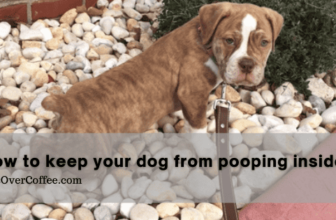
Living with several dogs in a multi-dog household can be incredibly satisfying, but it also comes with its own set of trials and tasks.
Note: This is a guest post by the folks from Scoop Soldiers, a pet waste removal company. Barbara edited it and shared pictures of her dogs.
Each dog brings its personality, needs, and interactions to the group, which creates a unique dynamic that requires careful management.
That said, it’s your job as the owner to create a pacific and happy environment for you and your furry friends.
Now, did you know that according to Forbes, dogs are the most prevalent pets in the U.S.?
Around 65.1 million households own a dog in the U.S., and 51% of dog owners consider their pets a family member.
And over 35% of house owners in the U.S. have more than one pet.
Keeping those numbers in mind, successfully managing a multi-dog household requires understanding the dynamics of a pack.
And also implementing strategies to ensure harmony among your furry companions.
So in this guide, we’ll explore valuable tips and techniques to help you navigate the complexities of a multi-dog household.

Disclaimer: This blog post contains affiliate links. I may earn compensation when you click on the links at no additional cost to you.
Establishing a Routine
Establishing a routine is crucial when you’re managing a multi-dog household.
That’s because dogs prosper on consistency, and an engrained routine can help cut stress and avoid conflicts.
Set systematic feeding times, play, and wandering sessions to provide structure and likelihood for your dogs.
Also, set up designated rest areas so that each dog has space when they need it.
These can be (wire) dog crates or dog beds.

Consistency in routines can help prevent jealousy and competition among dogs, which fosters a more peaceful coexistence in your home.
Related Reading: How to Stop Your Dog From Being Jealous of Your Partner
Setting Clear Boundaries
As stated earlier, setting clear boundaries is essential for managing a multi-dog household.
Dogs, like humans, need to understand the household rules to feel secure and avoid conflicts.
The best way to achieve this is to establish boundaries around food, toys, and sleeping areas to prevent resource guarding and aggression.
So, use consistent commands and reward good behavior to reinforce these boundaries.
Moreover, supervise interactions between dogs, especially during playtime, to ensure boundaries are respected.
That’s really important because clear boundaries help dogs understand their place in the pack hierarchy.
It reduces the likelihood of dominance-related issues and promotes a harmonious environment for all the dogs in the household.
Providing Adequate Resources
According to a survey done by USA Today, the average cost of maintaining a single dog is around $376 a month or $4,512 annually.
It includes the overall cost of owning a dog, like purchasing or adopting, and other ongoing expenses like vet care, dog food, etc.
When an owner has more than one dog, they have to be sure that they can provide adequate resources to their pets.
Providing adequate resources is key to managing a multi-dog household effectively and ensuring that each dog’s needs are met without disturbance.
To prevent rivalry during mealtimes, have multiple feeding bowls with water and food in different zones of the house.
Similarly, provide plenty of dog toys and healthy dog chews to keep your dogs occupied and prevent boredom-related behavior issues.
Each pet must have its bed or sleeping area to retreat to when they need some alone time.
Also, ensure enough space for each dog to use the bathroom comfortably and without interruption.
Adequate resources help prevent conflicts and promote peaceful coexistence among the dogs in your home.
Supervising Meal Times
Managing meal times for dogs is crucial without creating a mess or conflict.
By supervising meal times, you can be sure that each dog gets the accurate amount of food.
It also prevents one dog from stealing food from another, which can lead to fights or resource guarding.
It also allows you to supervise eating habits and quickly address potential health issues, like lack of appetite or food allergies.
Related Reading: How to Do an Elimination Diet for Dogs
Supervising meal times also helps establish a routine and discipline among the dogs as they learn to wait for their turn to eat.
Overall, supervising meal times promotes a peaceful and orderly feeding environment, which reduces the chances of conflicts and ensures that each dog gets sufficient nutrition.
Related Reading: How to Make Low-Cost, Homemade Raw Dog Food
Maintaining Hygiene and Cleanliness
Proper hygiene and cleanliness in a household with multiple dogs are essential for your pets’ and your family’s health and well-being.
Regular cleaning routines can help prevent the spread of disease and reduce odors associated with pet ownership.
Regular grooming, like bathing and brushing, can help reduce flaking and keep your dogs’ fur clean and vigorous. It will also prevent dust and debris from being traced into your home.
Related Reading: How to Make a Dog’s Coat Shiny
Accidents happen, especially with multiple dogs.
So it’s important to clean up accidents promptly to prevent odors and bacteria from spreading. Use pet-safe cleaners and deodorizers to effectively clean up messes.
Proper pet waste disposal is crucial for maintaining a clean and hygienic environment.
Consider hiring a pet waste removal service like ours (Scoop Soldiers) to regularly clean up your yard, especially if you have many dogs!
Compare pet waste removal prices in your area to find a service that fits your budget.
Your dogs’ bedding and toys can harbor dirt, bacteria, and odors.
Wash bedding regularly and clean toys with pet-safe disinfectants to keep them clean and germ-free.
If you have a yard, regularly clean up pet waste and remove any debris or trash that could attract pests or bacteria.
Make sure you use pet-friendly lawn care products to keep your lawn healthy for your pets.
Also, regularly check your dogs for fleas and ticks to help prevent infestations in your home.
Related Reading: How to Enjoy Spring & Summer Without Dog Pests
Ensuring Veterinary Care
Safeguarding veterinary care is essential in a household with two or more dogs to maintain their health and well-being.
Regular check-ups allow veterinarians to detect and treat any potential health issues early, which prevents them from becoming more serious or spreading to other dogs.
Related Reading: Peace of Mind with Pets Best Dog Insurance
Core vaccinations are also crucial for protecting your dogs from diseases that can easily spread among multiple pets.
Spaying or neutering your dogs can help reduce behavioral issues and prevent unwanted litters, which can be challenging to manage in a multi-dog household.
Overall, prioritizing veterinary care for each of your dogs helps ensure they live long, healthy lives and contributes to a harmonious and happy household.
Related Reading: 24 Strong Vets Who Endorse Raw Dog Food
Managing Interactions
Managing interactions between multiple dogs in a household is crucial for maintaining harmony and preventing conflicts.
Understanding canine body language and behavior is key to recognizing and addressing potential issues before they escalate.
Introduce new dogs to your existing pack gradually, and allow them to get acquainted in a controlled environment.
Supervise their interactions, especially during the initial stages, to intervene if necessary.
Establish rules and boundaries for interactions, such as no rough play indoors or no resource guarding.
Encourage positive behaviors with rewards and redirect negative behaviors calmly.
Providing plenty of dog toys, treats, and attention can also help reduce tension and promote positive interactions among your dogs.
Frequently Asked Questions
How can I prevent conflicts between my dogs in a multi-dog household?
To prevent conflicts between your dogs in a multi-dog household, establish clear rules and boundaries, such as no food or toy guarding.
Provide each dog with their own space, including separate feeding and sleeping areas.
Also, supervise their interactions and intervene if you notice any signs of tension or aggression.
How do I handle meal times and feeding schedules with multiple dogs?
To handle multiple dogs, establish a routine with set feeding times and separate feeding areas for each dog to prevent competition and conflicts.
Supervise meal times to ensure that each dog eats their food and prevent food stealing.
If necessary, consider feeding dogs in separate rooms or using feeding stations to manage the process more effectively.
What strategies can I use to establish a routine that works for multiple dogs?
To establish a routine that works for multiple dogs, start by setting consistent feeding, potty, and exercise schedules.
Ensure each dog has their own space for eating, sleeping, and playing to reduce competition and conflicts.
Slowly introduce and reinforce the routine, using positive support to encourage desired behaviors.
Bottom Line
In conclusion, managing a multi-dog household requires patience, consistency, and a good understanding of canine behavior.
By establishing clear rules, providing sufficient resources, and supervising interactions, you can create a pleasant environment for your furry friends.
Regular veterinary care, proper hygiene, and a well-maintained routine are also essential for ensuring the health and well-being of your dogs.
With these tips and strategies, you can successfully manage a multi-dog household and enjoy the companionship of your canine family members to the fullest.
Related Reading
(Visited 1 times, 1 visits today)








Thanks I have recently been looking for info about this subject for a while and yours is the greatest I have discovered so far However what in regards to the bottom line Are you certain in regards to the supply
This was a fantastic read. The analysis was spot-on. Interested in more? Check out my profile for more engaging discussions!